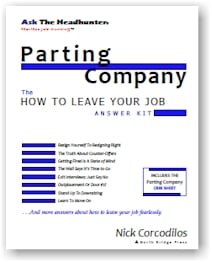In the February 3, 2015 Ask The Headhunter Newsletter, we take a look at how to leave your job without hurting your career.
Fired? Downsized? Need to resign?
 In last week’s edition, Your Boss Hates You: The politics of CYA, we discussed a reader’s difficult parting with her employer. Some of the busiest areas of the Ask The Headhunter website and blog are about what happens when you leave your job. If you’ve been fired, downsized, quit or are considering moving on, you may have already read some of my advice about these difficult situations:
In last week’s edition, Your Boss Hates You: The politics of CYA, we discussed a reader’s difficult parting with her employer. Some of the busiest areas of the Ask The Headhunter website and blog are about what happens when you leave your job. If you’ve been fired, downsized, quit or are considering moving on, you may have already read some of my advice about these difficult situations:
- Can an employer charge you for quitting?
- Say goodbye to your psychopathic boss
- How your old boss can cost you a new job
- How should I quit this job?
Although this blog is mostly devoted to Q&A — your questions and my advice — I’m going to take the liberty of using most of this edition to tell you about Parting Company | How to leave your job — a new PDF book that I’ve spent months preparing. I’ve gotten so many requests for a thorough Answer Kit about how to leave a job that I’ve produced this new 73-page guide that covers almost everything you could possibly need help with.
Parting company is a trying right of passage — and it’s important that you know how to do it on your own terms.
Resigning a job can be a stressful experience. Getting fired is far worse. But, on top of either, who wants to face a gut-wrenching exit interview on the way out the door? Suddenly, otherwise-confident people get clobbered by unnerving choices. You may have gotten fired or downsized, or you may be thinking of quitting — or perhaps you’ve landed a new job and you’re facing a confusing counter-offer from your old employer.
If you don’t part company on your own terms, you can get hurt.
Let’s look at an issue that’s not in Parting Company — but that suggests doing it wrong could cost you a great new job:
Question
I was recently let go without being given a reason. I believe it was because we had a disagreement. I felt my boss was too demanding and high strung, and he felt I was not aggressive enough. When I apply for jobs and they ask me what happened, what should I say?
I have been saying, “I was let go without being given a reason, without any warning.” Would it be better to say, “It was decided they need someone with a different type of background?”
Nick’s Reply
First of all, let’s quibble about semantics. “It was decided…” You make it seem that some unknown force took action. That’s how cowards phrase things. Use a definite source of the action:
“My boss decided the organization needed someone with a different background.”
Then add,
“I agreed. Our philosophies don’t mesh. In that business, it’s crucial to mesh. I’m looking for an organization that I’m compatible with.”
Don’t worry that you might turn an employer off by saying that. If you’re not compatible, it’s best to know immediately.
Don’t avoid discussing the fact that you were let go, but check your personnel paperwork carefully. Did they actually terminate you, or did they ask you to resign? In Parting Company | How to leave your job, see the section titled “Getting Fired is a State of Mind,” pp. 12-14. The attitude you project can make all the difference.
Parting Company | How to leave your job
Parting company fearlessly is just as important as joining a new employer confidently. For this new Answer Kit, I selected the toughest questions you’ve posed to me over the past 12 years — and I’ve enhanced and expanded some of the best advice I’ve shared on the website, in the newsletter, and on this blog. (You’ll find some articles are now gone from the website, because I’ve beefed them up and added more how-to juice to make them key parts of this new 73-page Answer Kit!)
These are just a few of the daunting challenges Parting Company is designed to help you with:
- Do you know how to resign? (p. 40)
- Should you consent to an exit interview? (p. 53)
- Did getting fired shatter your self-confidence? (p. 12)
- Should you accept a “package” to quit your job voluntarily? (p. 26)
- What’s the truth about counter-offers? Should you accept one? (p. 50)
- How can you prepare for the shock of a downsizing? (p. 20)
- Is outplacement a big, costly mistake? (p. 28)
- How do you explain to a new employer why you left your old one? (p. 58)
(Please take a look at the complete Table Of Contents.)
My goal with this new book is to help you make your next move successfully — and on your own terms!
The Crib Sheet
 Included in Parting Company is a 7-page Crib Sheet: A checklist of gotchas to avoid as you prepare to exit your company for the last time. I asked some of my favorite HR managers (Yes, I’ve got friends who are good HR managers!) to disclose their insider tips — about what departing employees must do to avoid trouble later, and to make parting as gentle an experience as possible. You’ll learn things that until now you never even worried about — but should have!
Included in Parting Company is a 7-page Crib Sheet: A checklist of gotchas to avoid as you prepare to exit your company for the last time. I asked some of my favorite HR managers (Yes, I’ve got friends who are good HR managers!) to disclose their insider tips — about what departing employees must do to avoid trouble later, and to make parting as gentle an experience as possible. You’ll learn things that until now you never even worried about — but should have!
+ BONUS MP3
But I won’t leave you hanging after helping you move on from your old job. Parting Company comes with a BONUS MP3 ![]() — It’s “all the best stuff” distilled from a workshop I gave at Cornell University’s Johnson School of Management. A lecture hall full of Executive MBA students came to learn How to make contacts that can lead you to a new job! If you’ve enjoyed the How to Say It tips I sprinkle throughout Ask The Headhunter, you’ll love this short, tip-filled audio bonus.
— It’s “all the best stuff” distilled from a workshop I gave at Cornell University’s Johnson School of Management. A lecture hall full of Executive MBA students came to learn How to make contacts that can lead you to a new job! If you’ve enjoyed the How to Say It tips I sprinkle throughout Ask The Headhunter, you’ll love this short, tip-filled audio bonus.
If you’ve subscribed to this newsletter for any period of time, you know that Ask The Headhunter is where you can come for answers — and not just answers you pay for when you buy a book. Every week, I welcome you to bring your questions, comments, stories and suggestions about the topics we discuss here — on the blog — where I do my best to offer advice about the unique problems and challenges you face. And, as a buddy of mine likes to put it…. Mo’ betta than that… you’ll get the insights and advice of the entire Ask The Headhunter community.
Like all Ask The Headhunter PDF books, Parting Company | How to leave your job comes with a 7-day full-refund guarantee.
Got a question about something that’s not in the book? Post it to the blog and we’ll all do our best to help you. If you try Parting Company, I’d love to know your reaction to this new 73-page Ask The Headhunter Answer Kit!
Are you facing a downsizing? Getting fired? Moving on and need to resign? What’s your specific issue or problem? Post it, and we’ll discuss it — and share the entire community’s great advice and suggestions!
: :



